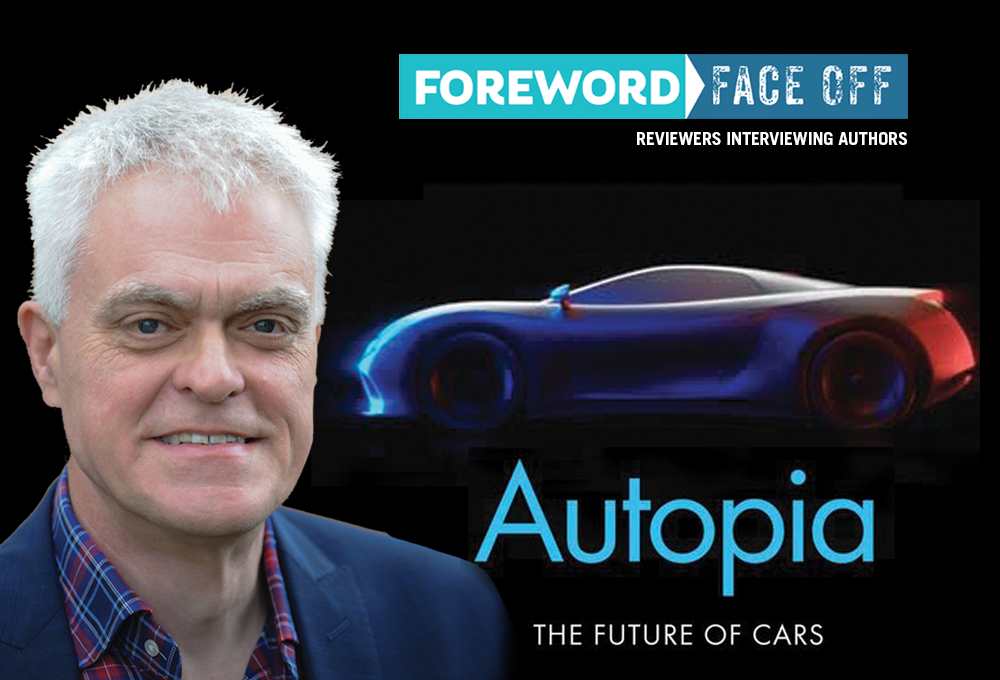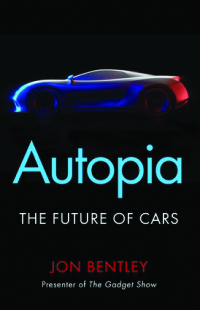Reviewer Jeff Fleischer Interviews John Bentley, Author of Autopia: The Future of Cars

As we take the first tentative steps into the 21st century’s 21st year, there’s no better time to reflect on the previous twelve months and, more importantly, prepare for what’s ahead. Unfortunately, the best advice might be to simply hang onto your britches because so much is happening, so much is changing, and so many forces are at play in the various fields of science and technology that no one has a friggin’ clue what tomorrow will bring. We live in exciting times.

This week, as we launch another season of Foreword This Week, we have the pleasure of spending time with a guy who really does have some clues about the future of the automobile industry in the coming years. Meet John Bentley, host of the British television series Top Gear, and the author of the newly released Autopia: The Future of Cars—reviewed by Jeff Fleischer in Foreword’s January/February 2021 issue.
With the help of Atlantic Books, we coordinated the following futuristic conversation between Jeff and John. So, hike up those britches and enjoy.
Jeff, you’re in the driver’s seat.
What was the specific inspiration to write Autopia?
I’ve been passionate about cars for as long as I can remember, so I’m naturally very interested in their future. I saw that developments in self-driving and artificial intelligence, and a predicted move away from oil and the internal combustion engine, was leading to the view that the car was about to experience faster change than at any time in its history. I wanted to find out what was actually going to happen. At the same time, I felt much of the debate about the car’s future was being conducted by people— including academics, environmentalists, and politicians—who don’t understand why many are so passionate about them. I was hoping to redress the balance a little by addressing some of the issues from a car enthusiast’s perspective.
In researching the book, what most surprised you? As someone who has known the auto industry well for a long time, what did you learn in the process?
The most surprising individual suggestion I heard was from the creators of the autonomous Robocar racing car. They envisage a rather frightening-sounding form of competition where autonomous cars would race on the same roads as normal traffic. It sounds quite scary for everyday road users, though it could potentially make an interesting spectator sport.
Writing the book helped me to answer the questions that were running through my own head by speaking with a wide range of people with a stake in the car’s future, Questions like how realistic some of the dreams of autonomy are, whether some of the pollution concerns are as big as feared and can be overcome, whether the kind of car passion I’ve grown up with has a future, and the prospects for classic cars and motorsport.
Of all the new technology you write about in Autopia, which do you find the most exciting and why?
At a personal level, one of the things I’d most like to experience is the exciting form of self-driving technology where a virtual top racing driver demonstrates to you how to drive faster round a track in a high-performance car. I’m also particularly excited to see how developments in small-scale manufacturing technologies, like 3-D printing, will enable a return to more bespoke car design. In combination with advances in accident-avoidance tech, it will allow the creation of highly individual cars that can be safe without being comprehensively crash tested. I love the idea that one day soon you’ll be able to sit down with your own personal car designer, sketch something up on a screen, and create your own fantasy car, which can appear on your drive as a usable reality within weeks.
Conversely, what do you see as the biggest challenge to the future of automobiles?
I think the main threat is that they continue to be victims of their own success. The combination of pride of ownership, the fantastic sense of liberty and self-esteem they generate, the amazing range of emotions and pleasures they give you, is such that they’re too popular for their own good, particularly in towns and cities. There simply isn’t room for people to own and use the number of cars they’d like. An urban-rural divide may emerge, with the joys of car ownership and driving alive and well in the countryside and suburbs, but with car sharing, autonomous vehicles, and public transport increasingly dominant in towns and cities.
In a later chapter, you discuss the future of classic cars, and how collectors may view today’s vehicles. What qualities do you think will most make a current vehicle worth collecting in the decades to come?
I think the traditional factors of fantastic looks, and the promise of a satisfying, tactile drive will continue to motivate collectors, particularly when supplemented by the allure of a motorsport pedigree. Though actually more or less anything can be collectible to a degree. It’s still heartening that cars which are unloved when new can discover a following with age and rarity.
What do you most hope the audience comes away with after reading Autopia?
I hope they’ll come away with a reasonably optimistic feeling—that cars actually do have a future and that being a car enthusiast is not something you need to feel overly guilty about. Cars will continue to offer pleasure and delight, but more safely and with less cost to the environment.
Jeff Fleischer
